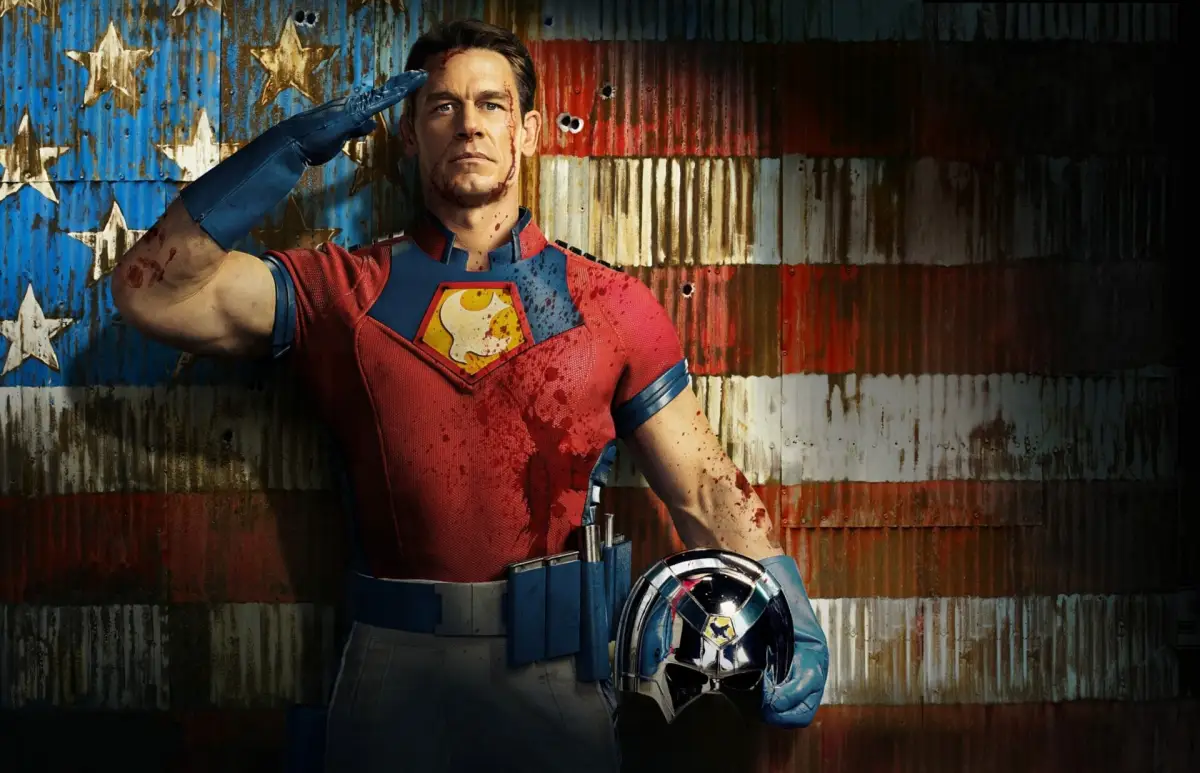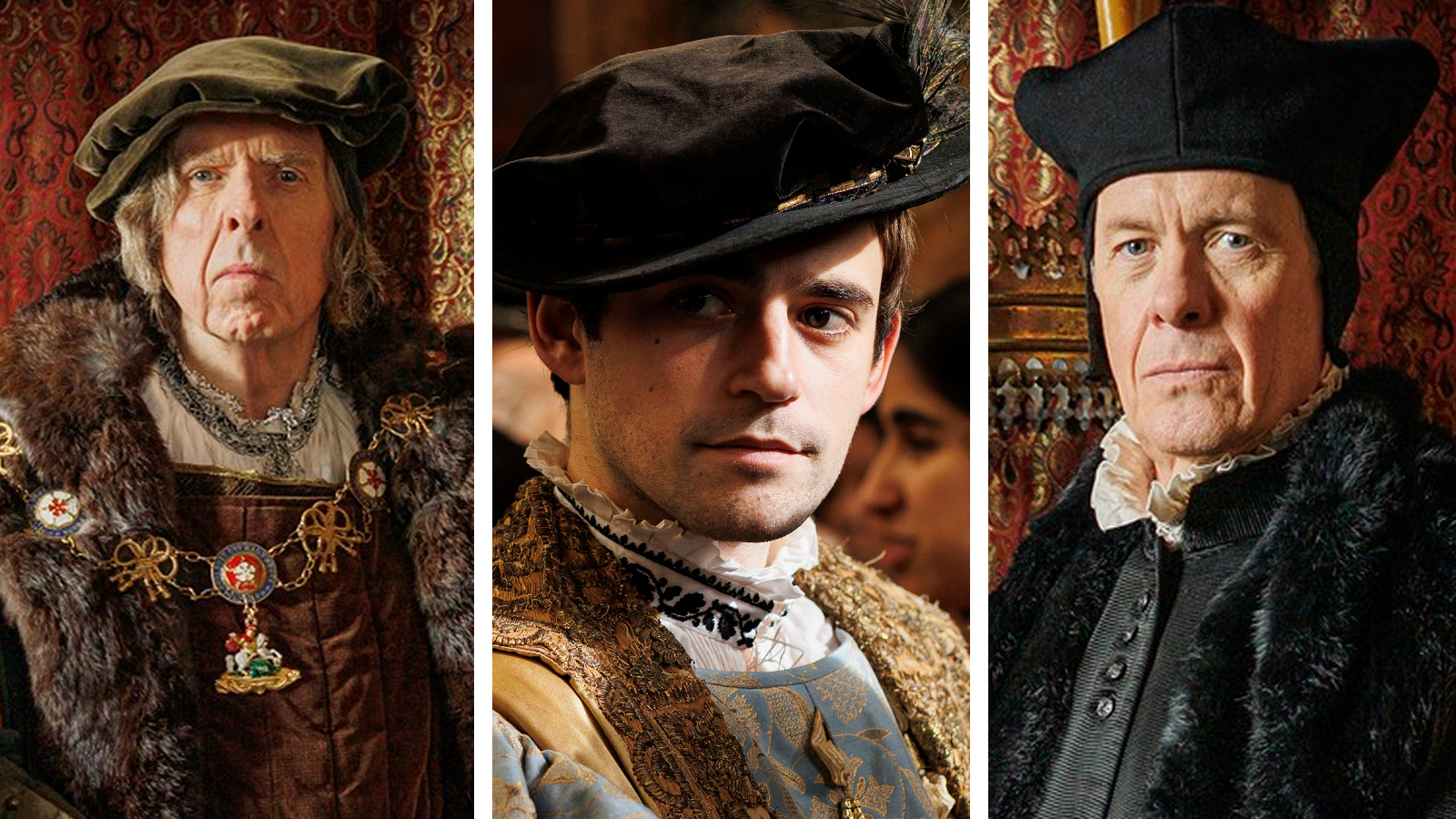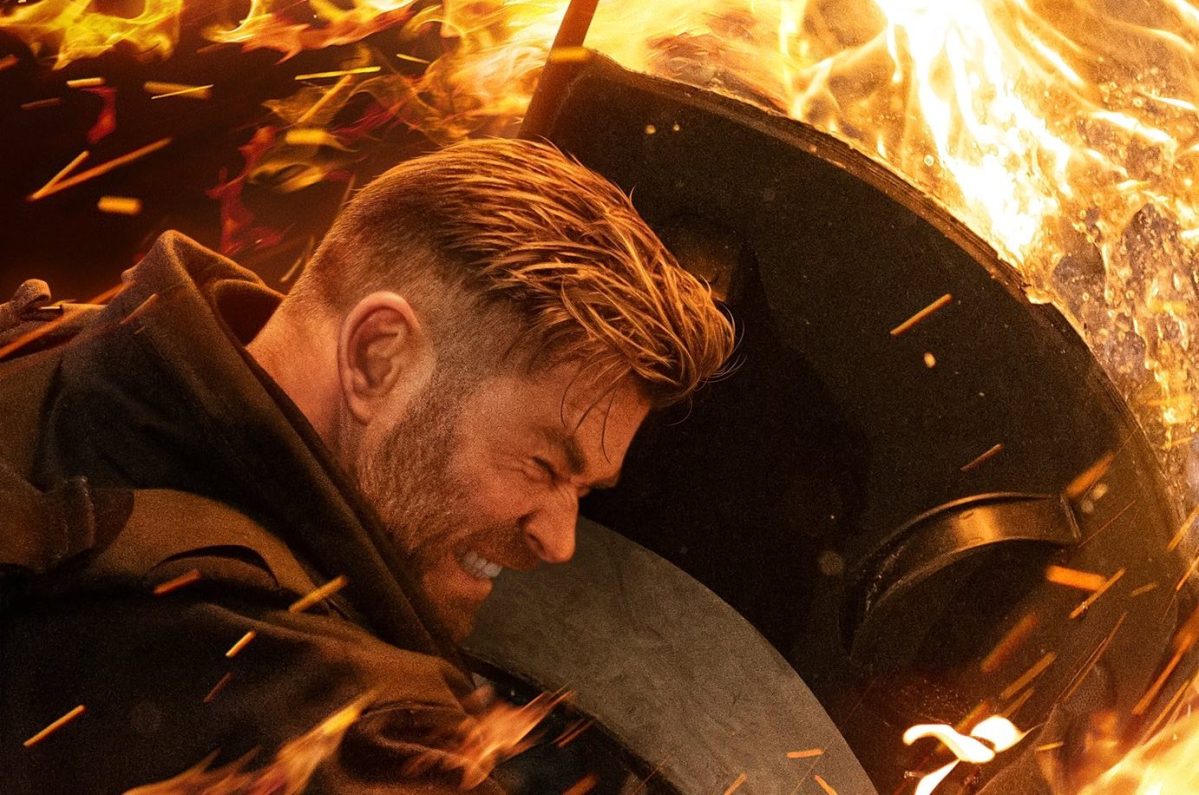This discussion and review contains massive spoilers for Peacemaker episode 8, “It’s Cow or Never” on HBO Max. Do not scroll down if you don’t want spoilers.
“It’s Cow or Never” offers a bombastic finale to the first season of Peacemaker, tying the season’s big themes together and offering a suitable amount of spectacle.
In interviews promoting the series, Gunn has been quite candid that the finale is his favorite episode of the season and that it was withheld from press previews over concern about spoilers. It seems likely that the specific concern over spoilers concerned the cameos from Ezra Miller and Jason Momoa, reprising their roles as the Flash and Aquaman. Superman and Wonder Woman appear in shadow, suggesting that Gal Gadot was busy and Henry Cavill is still in limbo.
The cameo is, admittedly, cute. It’s a testament to the degree of trust that Warner Bros. has placed in Gunn – trusting the writer and director to make bestiality jokes about the star of a billion-dollar franchise and allowing the star of that franchise to appear in such a scene. It’s playful and silly. It is exactly the sort of tonal flexibility that a shared universe should allow, where Miller and Momoa can star in a sweeping epic like Zack Snyder’s Justice League and pop up as figures of fun in Peacemaker.
However, it is also a testament to “It’s Cow or Never” that the gigantic universe-crossing cameo doesn’t overshadow Peacemaker. It is a charming throwaway gag and a nice illustration that the shared universe is big enough to support such tonally disparate projects, but there is much more at foot in “It’s Cow or Never.” While it seems certain to generate headlines and publicity, the cameo is a cherry on top of the finale. It is not the whole meal.
Gunn has talked about how he approaches working on projects like Peacemaker. The third act finale is crucial to the success of the larger narrative. “I have a philosophy on movie making that is probably my best contribution to filmmaking,” Gunn has explained. “And that is, you take half of your movie to shoot the first two acts, and the other half of the movie, you shoot the third act. That is the way that a third act works better than the first two acts, and most movies don’t do it.”

“It’s Cow or Never” demonstrates the appeal of such an approach. The finale has a larger scale and a grander sweep than the previous episodes. It clearly ate up a significant amount of the show’s budget. This isn’t a problem, as part of the appeal of Peacemaker has been watching Gunn operate in a lower-budget range with a greater degree of creative freedom. However, with new sets, green screen work, and a computer-generated “motherfucking caterpillar the size of the Empire State Building,” it is obvious that Gunn put his philosophy into effect on Peacemaker.
Even beyond the use of computer-generated imagery, there are a number of impressive and elaborate set pieces, such as the sequence when Peacemaker (John Cena), Vigilante (Freddie Stroma) and Emilia Harcourt (Jennifer Holland) charge the butterflies following the collapse of the barn. Watching the scene play out, it is clear Gunn knows how important this action beat is to the larger show. It is a moment of catharsis and spectacle.
The stunt choreography and camerawork are impressive. The camera swirls around the action as the actors and stunt performers hit their marks. The show’s theme music by Wig Wam, “Do You Wanna Taste It?” swells in the background. Each of the characters gets moments to showcase their badass bona fides. It is genuinely thrilling and visceral, in a way that televised superhero action is rarely allowed to be. Gunn and his cast take a real pleasure in delivering this throwdown.
Much like the Justice League cameo at the end of the episode, it’s possible to read the big showdown as Gunn reaffirming Peacemaker’s superhero credentials. From Black Panther to Avengers: Infinity War to Avengers: Endgame, the “superheroes have a big showdown in the middle of an empty field” has become a modern staple of the genre, and it is charming to see Gunn put a bloody medium-budget spin on the now-familiar template.

That said, Gunn returns to his core themes in “It’s Cow or Never.” Despite dying in the previous episode, Auggie Smith (Robert Patrick) makes a return here as a vision (or “a metaphor”) haunting his son. “I’m in your head,” Auggie taunts his son, a theme that the episode underscores by having this vision of Auggie inadvertently guide his son to a lost helmet. “I’m the reason you kill, and the reason you can’t sleep at night.” In the episode’s final shot, Auggie is still haunting Peacemaker.
It’s an interesting choice that takes advantage of the format of Peacemaker as a television series. Peacemaker is, in many ways, a show about children navigating their troubled relationships with parents. As self-contained narratives, films tend to treat these relationships as things that can be definitively and handily resolved. As a television show, Peacemaker can explore the more complicated long-term implications of Peacemaker’s relationship to his father.
Peacemaker and Auggie’s relationship is mirrored in Leota Adebayo’s (Danielle Brooks) relationship with her mother, Amanda Waller (Viola Davis). Adebayo embraces the skills her mother tried to nurture in her. “What makes you think you can do this?” John Economos (Steve Agee) asks as she rushes into battle. “Because I’m made for this shit,” Adebayo responds. However, the season ends with Adebayo firmly and publicly breaking with Waller, exposing the Suicide Squad to the world.
“It’s Cow or Never” also has noteworthy things to say about the larger superhero genre. As with a lot of Gunn’s work, the climax of “It’s Cow or Never” feels like it is explicitly in conversation with Alan Moore and Dave Gibbons’ Watchmen. In “Quit Dragon My Heart Around,” Gunn seemed to engage with Moore’s criticisms about the association between superheroes and the history of vigilantism in American popular culture, throwing Peacemaker into conflict with his white supremacist father.

The climax of “It’s Cow or Never” returns to the climax of Watchmen, both in terms of theme and narrative. In simple plot terms, as with the finale of Watchmen, “It’s Cow or Never” hinges on the teleportation of a larger monstrous entity – an actual alien in “It’s Cow or Never,” and a manufactured alien in Watchmen. However, Gunn is more directly engaged with the underlying themes of Watchmen concerning the limitations of superheroes.
In Watchmen, the superhero Ozymandias decides to murder millions of people in a false-flag attack that will unite and galvanize humanity against a common threat. In a world on the brink of nuclear annihilation, Ozymandias justifies mass murder by arguing that it is a necessary sacrifice to save the entire human race from their own worst impulses. Watchmen opens with Ozymandias’ murder of the vigilante known as the Comedian, a character based on Peacemaker, to cover up this crime.
The climax of “It’s Cow or Never” effectively offers an inversion of that finale. Like Ozymandias, the alien controlling Sophie Song (Annie Chang) argues that the butterflies are acting in the best interests of humanity. Song warns Peacemaker about humanity’s worst tendencies, “ignoring science in favor of populist leaders” and “treating minor inconveniences as assaults on your freedom.” Like Ozymandias, the butterflies assume that they know better.
“And so we made a vow to do anything we could to change your future,” Song tells Peacemaker, directly evoking Peacemaker’s own “vow” to pursue peace no matter the cost. “We made a vow to make the choices for you that you were incapable of making on your own, to save your people and your world, no matter how many lives it cost us.” It’s a nice counterpoint to Peacemaker’s desire for peace, “no matter how many men, women and children (he has) to kill to get it.”

This is, in many ways, a limit case for the superhero as a genre. What is the superhero but a power fantasy about a perfect being that will keep the world safe from any threats, no matter how many laws or norms they violate to do so? Song makes the parallel explicit. After all, Judomaster (Nhut Le) was an ideological convert, rather than a forced convert, to the butterflies’ scheme. “You’re one of us, Christopher Smith,” she assures him. “Be the Peacemaker. Join us in saving your planet.”
Ultimately, Peacemaker has the strength of character and principle to do what neither the Comedian nor Rorschach could do in Watchmen. He not only declines to be complicit in such horror, but actively resists it. He kills “the holy cow” and defeats the butterfly invasion. “Did I just kill the world?” he asks Adebayo in the aftermath. “Maybe,” she responds, “or maybe you just gave us a chance to make our own choices instead of our bug overlords?”
Crucially, though, “It’s Cow or Never” frames this as a moment of humanity rather than an act of superheroism. Adebayo wonders if Peacemaker was motivated by his “proto-fascist libertarian idea of freedom,” but he rejects this reading. Peacemaker explains he made the choice to stop the butterflies from killing Adebayo and Harcourt, presumably because they would have rejected their new “bug overlords.” He chose humanity, regardless of how “pathetic” humans can be.
As such, “It’s Cow or Never” feels like the perfect place to leave the first season of Peacemaker. It’s a fitting encapsulation of the show’s big themes and its character work. It’s also something of an exploration of the superhero as both a genre and a concept. It’s also a delight. Gunn will be back for the second season of Peacemaker. Hopefully, we will be too.














Published: Feb 17, 2022 5:30 PM UTC